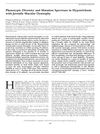 2 citations,
December 2023 in “Royal Society of Chemistry eBooks”
2 citations,
December 2023 in “Royal Society of Chemistry eBooks” Hair is a complex organ, and understanding its detailed structure and growth phases is crucial for analyzing substances within it.
 2 citations,
June 2017 in “Pediatric Dermatology”
2 citations,
June 2017 in “Pediatric Dermatology” A critically ill boy experienced hair loss likely due to the stress of his medical treatments, but his hair regrew completely in 1.5 months.
 2 citations,
January 2008 in “Elsevier eBooks”
2 citations,
January 2008 in “Elsevier eBooks” Humans have limited regenerative abilities, but new evidence shows the adult brain and heart can regenerate, and future treatments may improve this by mimicking stem cell environments.
 113 citations,
September 2005 in “Journal of Investigative Dermatology”
113 citations,
September 2005 in “Journal of Investigative Dermatology” Applying a special compound can promote hair growth without harmful side effects.
 91 citations,
August 2014 in “Development”
91 citations,
August 2014 in “Development” The circadian clock is crucial for tissue renewal and regeneration, affecting stem cell functions and having implications for health and disease.
 65 citations,
April 2020 in “International Journal of Molecular Sciences”
65 citations,
April 2020 in “International Journal of Molecular Sciences” PRP injections may be a safe, effective alternative for hair loss treatment compared to minoxidil and finasteride.
 56 citations,
November 2010 in “Pigment Cell & Melanoma Research”
56 citations,
November 2010 in “Pigment Cell & Melanoma Research” Brain hormones significantly affect hair color and could potentially be used to prevent or reverse grey hair.
 47 citations,
April 2000 in “The American journal of pathology”
47 citations,
April 2000 in “The American journal of pathology” Bcl-2 overexpression protects against UVB damage but worsens hair loss from chemotherapy.
 30 citations,
September 2003 in “Experimental Dermatology”
30 citations,
September 2003 in “Experimental Dermatology” Minoxidil helps prevent stress-caused hair loss in mice.
 16 citations,
November 2009 in “Experimental dermatology”
16 citations,
November 2009 in “Experimental dermatology” Ionizing radiation damages human hair follicles by stopping cell growth, causing cell death, disrupting color, and increasing stress and damage markers.
 10 citations,
September 2020 in “Archives of Dermatological Research”
10 citations,
September 2020 in “Archives of Dermatological Research” Both methods improve hair density and thickness; double-spin may be more effective.
 10 citations,
April 2000 in “Archives of Oral Biology”
10 citations,
April 2000 in “Archives of Oral Biology” Minocycline may cause hair loss by increasing DHT levels, but finasteride can help counteract this effect.
 3 citations,
September 2017 in “The journal of investigative dermatology/Journal of investigative dermatology”
3 citations,
September 2017 in “The journal of investigative dermatology/Journal of investigative dermatology” CBD can either promote or inhibit hair growth depending on the concentration used.
 September 2018 in “Cosmetics”
September 2018 in “Cosmetics” Inositol and arginine solutions improve hair follicle health and turnover.
 April 2012 in “Informa Healthcare eBooks”
April 2012 in “Informa Healthcare eBooks” Lichen planopilaris is a rare, chronic condition causing hair loss, mainly in middle-aged women, and early treatment is important to prevent permanent baldness.
 378 citations,
November 2011 in “Human reproduction update”
378 citations,
November 2011 in “Human reproduction update” Experts recommend using evidence-based methods to diagnose and treat hirsutism, focusing on symptoms and underlying causes.
 192 citations,
January 2015 in “Journal of the American Academy of Dermatology”
192 citations,
January 2015 in “Journal of the American Academy of Dermatology” Targeted cancer therapies often cause serious skin problems that need careful management.
 98 citations,
July 2014 in “Trends in Molecular Medicine”
98 citations,
July 2014 in “Trends in Molecular Medicine” Hair follicles are hormone-sensitive and involved in growth and other functions, with potential for new treatments, but more research is needed.
 60 citations,
August 2008 in “Human molecular genetics online/Human molecular genetics”
60 citations,
August 2008 in “Human molecular genetics online/Human molecular genetics” A position effect on the TRPS1 gene causes excessive hair growth in humans and mice.
 52 citations,
November 2003 in “Journal of Investigative Dermatology”
52 citations,
November 2003 in “Journal of Investigative Dermatology” Different harmful mutations in the CDH3 gene cause HJMD, but symptoms vary among individuals.
 46 citations,
September 2014 in “Steroids”
46 citations,
September 2014 in “Steroids” Plant steroid hormones show growth, health, and medicinal benefits in various organisms, including potential for treating diseases.
 19 citations,
January 2018 in “Scientific Reports”
19 citations,
January 2018 in “Scientific Reports” Non-immune factors play a significant role in alopecia areata.
 17 citations,
June 2017 in “British Journal of Dermatology”
17 citations,
June 2017 in “British Journal of Dermatology” The article concludes that hair loss is a common side effect of drugs treating skin cancer by blocking the hedgehog pathway, but treatment should continue, and more selective drugs might prevent this side effect.
 14 citations,
January 2013 in “Journal of Cutaneous Medicine and Surgery”
14 citations,
January 2013 in “Journal of Cutaneous Medicine and Surgery” Some cancer treatments can cause permanent hair loss.
 12 citations,
June 2020 in “Frontiers in Cell and Developmental Biology”
12 citations,
June 2020 in “Frontiers in Cell and Developmental Biology” The PP2A-B55α protein is essential for brain and skin development in embryos.
 4 citations,
February 2022 in “Frontiers in molecular biosciences”
4 citations,
February 2022 in “Frontiers in molecular biosciences” Chronic stress in mice changes skin metabolism and gene expression, leading to hair loss.
 4 citations,
July 2010 in “Journal of Plastic Reconstructive and Aesthetic Surgery”
4 citations,
July 2010 in “Journal of Plastic Reconstructive and Aesthetic Surgery” A man developed a rare cancer on his scalp after a hair transplant possibly due to sun damage, laser effects, and inflammation.
 3 citations,
September 2022 in “Frontiers in veterinary science”
3 citations,
September 2022 in “Frontiers in veterinary science” Melatonin affects cashmere growth in goats by influencing stem cell and certain signaling pathways.
 3 citations,
January 2016 in “Elsevier eBooks”
3 citations,
January 2016 in “Elsevier eBooks” Steroid hormones are crucial for body functions and have various medical uses, but their misuse can lead to dependence.
 November 2021 in “Austin therapeutics”
November 2021 in “Austin therapeutics” Current treatments for hair loss from chemotherapy are limited, but new methods are being researched.






























